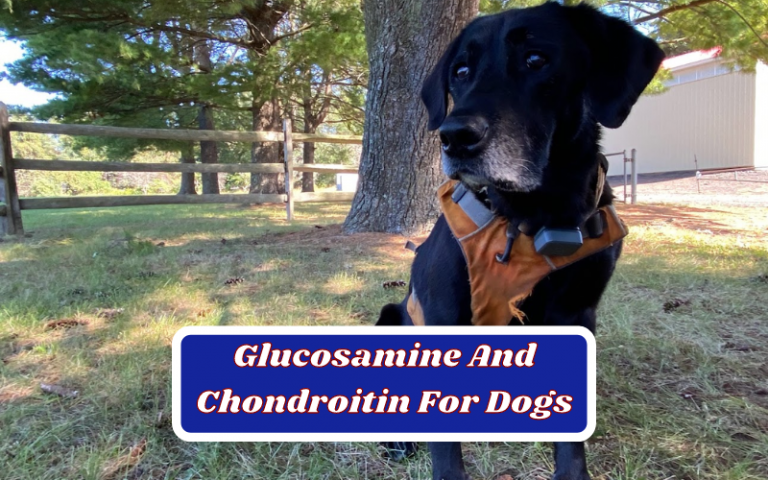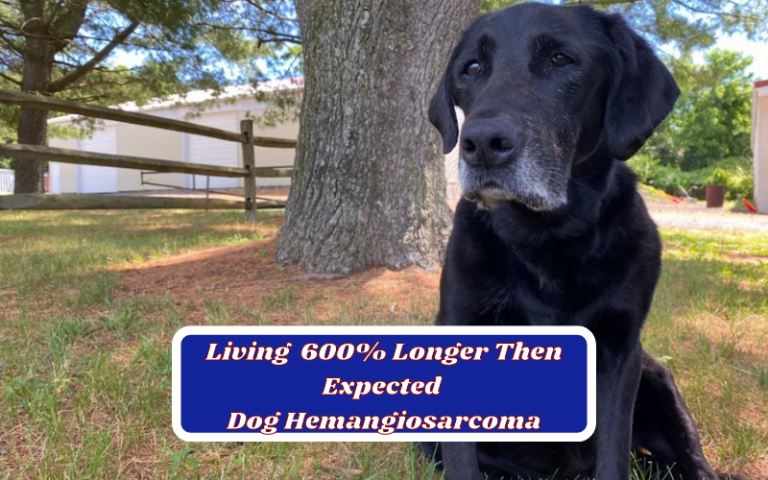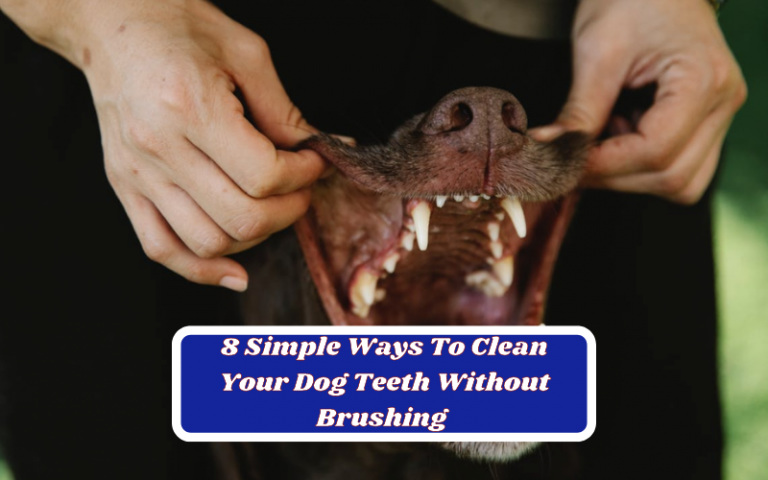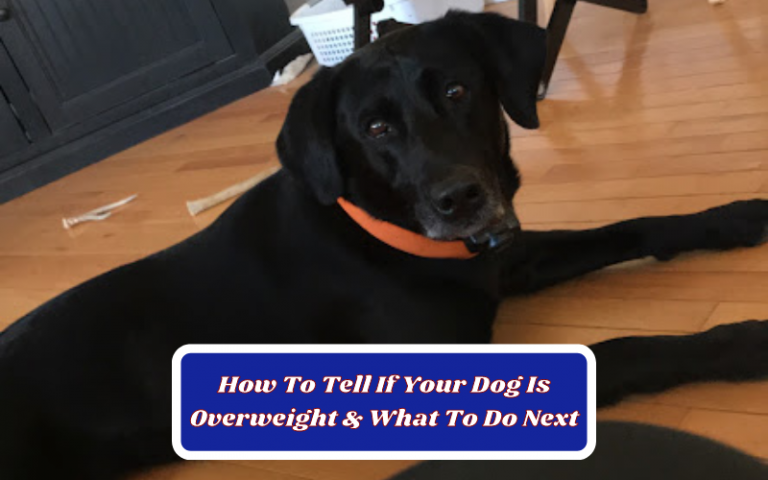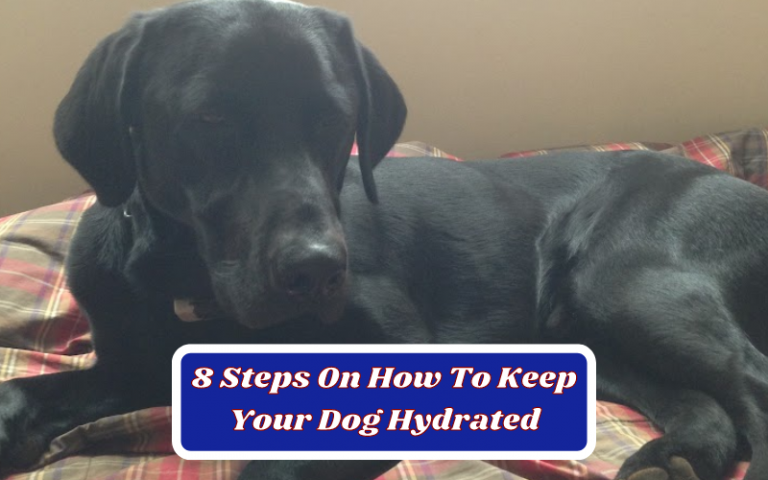5 Best Dog Weight Loss Supplements – Proven Supplements
* This post contains affiliate links, and we will be compensated if you buy after clicking on our links.
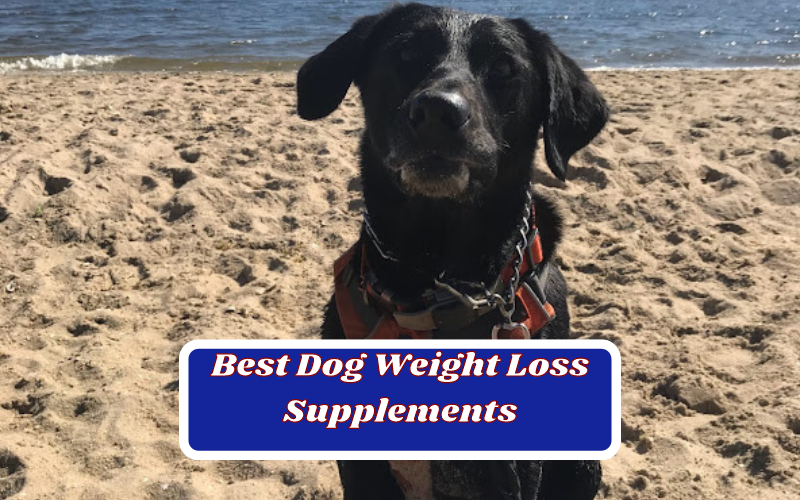
In the Untied States, obesity is a major problem. Given how common obesity is among humans, it is not surprising that it is a problem for pets as well. But do not worry, because in this article we will be going through the best dog weight loss supplements and the best tips to prevent this.
To help you, we’ve reviewed some of our top picks, created a FAQ section with answers to your questions, and written a specialized buyer’s guide.
With that being said, let’s get started!
Our Best Dog Weight Loss Supplements
Why Is Dog Obesity Dangerous?
According to the most recent statistics, 56% of dogs in the U.S. are either overweight or obese. In spite of the fact that this makes obesity a serious health crisis for dogs, many pet owners may not even be aware that their animals are overweight.
A dog’s health and lifespan are impacted by obesity. Dog obesity has a wide range of long-term health effects, including increased risk of developing malignant tumors, harsh joint pain, and many other issues.
The good news is, a lot of this can be prevented. There are even some things you can do to help with each one of these symptoms as well. But the most important thing you can do is get your dog’s weight down to a healthy level.
Even if your dog is overweight, health issues could start to appear. If you notice that your dog is in this situation, you should start to take action. If nothing is done here, obesity will eventually set in and the health issues will intensify.
Dogs are deemed obese when their weight is more than 20% above their ideal body weight and are considered overweight when their weight is between 10% and 20% above that.
What To Do If My Dog Is Obese?
The best methods for helping a dog lose weight are a better or more limited diet and exercise. By feeding your dog a well balanced, weight loss focused diet, your dog will be able to start shedding that excess weight and be on his way to a healthy weight.
Another thing you will want to focus on is exercise. Getting out and taking your dog on daily walks. Teaching them to play fetch, allowing them to swim / teaching them to swim. All of these things can be fun for your dog, and help them lose weight.
If your dog is not interested in many of these things, then you should focus on mental exercises, and focusing on getting them moving around. Here, diet will be crucial and you will need to focus on some of our weight loss formula recommendations.
Another wildcard, which we will be discussing on this article are the many weight loss supplements for dogs that you can use to quicken and help the weight loss process. To get the best results, always go over any diet modifications and supplement usage with your veterinarian first.
5 Best Dog Weight Loss Supplements
L-Carnitine

L-carnitine is an amino acid-based substance that resembles a vitamin. It can aid in weight loss in both humans and animals and is naturally present in proteins derived from animal sources.
It has been discovered to have an impact on behavioral health, feline hepatic lipidosis, and obesity.
One study monitored three groups of 30 obese dogs each received a different dosage of L-carnitine. In comparison to the group that did not receive any carnitine, the two groups that were fed 50 ppm and 100 ppm of carnitine each lost 6.4% and 5.7% of their body weight after seven weeks. The dogs that did not receive any L-carnitine lost 1.8% of their body weight.
This study also allowed us to learn that there was no benefit to increasing the amount of L-carnitine in a diet beyond 50 ppm (50 mg/kg of diet), as there was no difference between the 50 ppm and 100 ppm groups.
It also showed us the L-carnitine is a very good supplement tot help aid weight loss in dogs.
L-carnitine aids the dog’s body cells in converting fats into energy. It adheres to fatty acids and transports them from the cell’s interior to the mitochondria, a cellular organelle that generates more enduring energy.
It is usually a safe choice and one of the top supplements available for dog looking to lose weight. It can be purchased separately or as an ingredient in a variety of dog health supplements. We recommend Nutrition Strength’s Cardio Support. You can find it above, when you click the button.
White Kidney Bean Extract
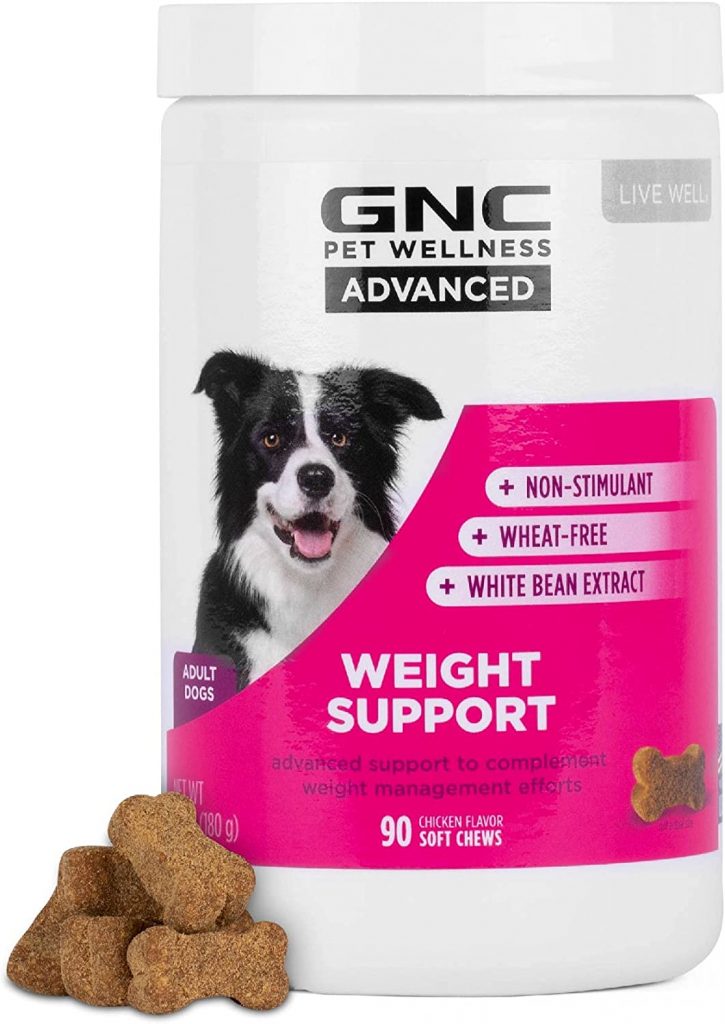
This diamond in the rough is a great supplement for your dog who is overweight. White Kidney Bean Extract can stop the body from absorbing starch (and breaking down.)
Basically it stops the breakdown of starch and stops the dog’s body from absorbing them. It does this by interfering with alpha amylase, a digestive enzyme, whose role is to break starch down into simple sugars.
This starch blocker should be added to your dog’s food for nine weeks to get the best results. Your veterinarian should advise you on the proper dosage, which is typically 500 mg for dogs under 50 pounds and 1.5 grams for canines over 80 pounds.
GNC Pets Advanced Weight Support is a weight-control supplement for dogs that can assist with managing your dog’s weight.
GNC Pets’ weight-controlling dog supplements use premium ingredients like white bean extract, but they also have more ingredients to help with weight loss.

Fish is the main source of Omega-3 fatty acids, but adding fish to your dog’s diet frequently may not be beneficial due to the higher calorie content.
Omega-3 fatty acids can also be given to dogs as supplements in the form of fish oil to gain the advantages of accelerating weight loss. There are numerous other confirmed health advantages of fish oil for dogs.
There is a ton of research on omega-3s, their health advantages, and their potential to help people lose weight. Together with a healthy diet, omega-3 fatty acids can aid dogs in losing weight because they have the ability to burn fat.
Appetite Controller
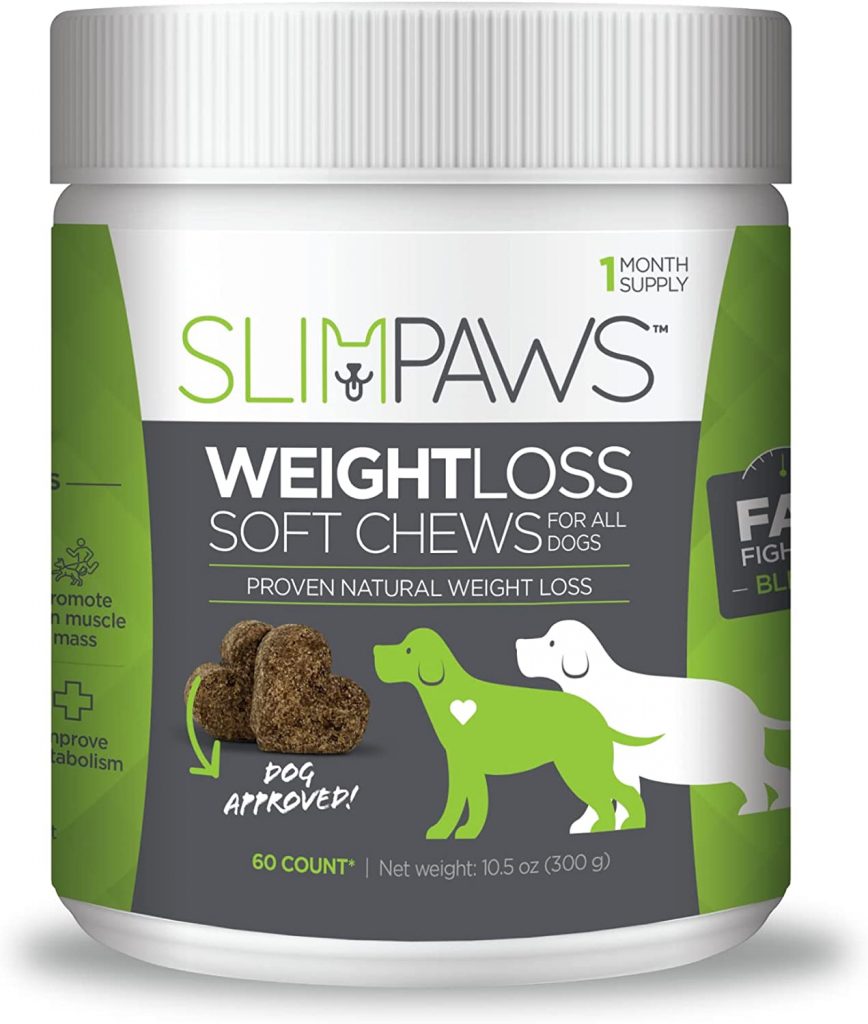
Helping dogs reach and maintain a healthy weight by using ingredients that are all-natural and secure, making them suitable for dogs of all ages and sizes.
In order to reduce the rate at which food turns into fat, SlimPaws naturally interacts with your dog’s metabolism.
Slimpaws helps with your dog’s appetite as well as gives them many fruits and lean chicken to help with energy which can allow them to be more active and wanting to do more, hence allowing them to burn more calories.
L-Arginine
L-Arginine is another amino acid supplement that is similar to L-Carnitine. Despite the need for more research on the effects of this specific chemical, preliminary studies on obese mice, pigs, and humans have shown encouraging weight loss results without calorie restriction.
The findings imply that the supplement can be used for dogs, particularly small and toy breeds, who cannot be placed on a calorie restriction and who only need to lose a few extra pounds. While L-Arginine is thought to be safe for animals, there has not been adequate research testing its safety with dogs. As such, you should speak with your veterinarian about using this supplement and determining the right dosage.
It also may be a little more difficult to find an appropriate product that is safe for your dog.
Buyer’s Guide for Best Dog Weight Loss Supplements

A balanced diet containing the right amounts of protein, fats, and carbohydrates is always the most important thing to focus on, when it comes to helping your dog lose weight.
Just like humans, losing weight require dedication, consistency, and a game plan that also includes a high-quality, portion-controlled diet and regular exercise in order to be effective. However, having some knowledge of the top weight-loss supplements can significantly help your dog and speed up this whole process.
Nutritional Requirements
Making sure the supplement you are planning to give to your dog is safe for animals is a must. Many times, these supplements may not be dog or animal specific. If you’re thinking about giving your dog one of these, you should speak to your vet before hand. In fact, you should speak to your vet before giving any of these supplements or any other supplement.
Read The Labels
Always be aware of the substances you give your dog’s body. Read the labels. Spend some time learning about the ingredients and what they are.
Look around our site if you’re not aware. This is the reason we started this blog. To not only teach and clarify what is good and bad for your dog, but to also teach you how to spot these things immediately.
Vitamins and Minerals
Vitamins and minerals are essential components of a balanced diet, just like every other nutrient. They provide nutrition for the skin and coat, support the immune and gastrointestinal systems, and ensure that the stomach, eyes, brain, and other organs function normally.
The two main types of vitamins are those that are naturally occurring and those that are produced chemically. Natural vitamins are present in fruits and vegetables, but during high-temperature cooking, a lot of these nutrients can be lost.
But why are we sharing this here?
Well, if your dog is going to be going on a diet, many times they may not be getting the full recommendation of these vitamins and minerals. Just like us humans, when we go on a diet, we may not be getting all the nutritional ingredients we need.
So adding a multi vitamin is always a nice add on to give to your dog. We recommend VETRISCIENCE Canine Plus MultiVitamin for Dogs.
Health Problems in Overweight Dogs
Dogs with excess fat have poorer health and shorter lifespans. There have been studies that state found that being overweight was linked to a shorter lifespan in all 12 dog breeds that were examined. This study was published in the Journal of Veterinary Internal Medicine in 2018 and the reduction of lifespan was 2.5 years.
Obese dogs are more susceptible to heart disease, and several types of cancer. On top of that, they often are subject to the following health issues:
- Type 2 diabetes
- Osteoarthritis, especially in the hip (Joint pain)
- High blood pressure
- Orthopedic problems, cranial cruciate ligament injuries
- Skin disease
- Heart and Respiratory Disease
Joint Issues
When it comes to joint issues, obese is a silent killer here. Most people don’t realize the issues until it is too late. The wear and tear of your dogs joints from obesity is due to the fact that they are carrying all this extra weight, wearing down their joints, and by them time they become a senior dog, there joints just worn out.
How to Tell If Your Dog Is Obese

While there are different guidelines for people, determining whether your dog is overweight or obese depends on both outward appearance and physical characteristics. Standing behind your dog, gently run your hands along either side of the rib cage. You should be able to feel, but not see each rib. If your dog has lost his waist or you can pinch more than an inch, it may be time to start cutting back and going on a diet.
What to Do If Your Dog Needs a Diet?
There are a few tried-and-true techniques for losing weight, just like with humans. To begin with, you should consult your veterinarian to ensure that the extra weight is not due to a condition or disease that is already present. You should have your dog examined and consult with your veterinarian about the best options before changing the food or caloric intake. Some of the best steps to do are the following:
Best Blend Of Food:
Making sure your dog has the best food to help fuel there weight loss journey is critical. Make sure to read our article on what to look for and what are our recommendations
Supplements
Adding weight loss supplements like L-carnitine and white kidney bean extract are also game changers. They will help fuel the whole journey and help your dog lose weight quicker. As always, make sure to speak to your vet before giving any supplement to your dog.
Set a Schedule:
If you free-feed, leaving food out all day, serve meals according to a predetermined timetable. Place the food down for a set period of time—say, 15 minutes—and then pick up any leftovers the dog leaves behind.
Pick Low-Calorie Treats:
Many store-bought sweets, particularly biscuits, can contribute to weight gain. Chews and bully sticks as well can lead to weight gain. But, fruits or vegetables, such as bananas, carrots, and apple slices, will make most dogs just as happy, taste great, and have a suite of health benefits for your dog.
FAQ Questions
How long does it take for a dog to lose weight?
Most dogs will typically lose 1 to 2 pounds per month using this method, reaching their ideal weight in 6 to 8 months.
Why is my dog overweight but doesn’t eat much?
Hypothyroidism or another health issue may be present. Hypothyroidism is when the thyroid, is underactive and therefore slows the metabolism (the Thyroid what regulates the body’s metabolic rate). You should make an appointment with your dog’s veterinarian to have any potential medical conditions checked.
How much exercise does an overweight dog need?
If your dog is overweight (not obese) and has no joint, heart, or respiratory issues, then 30 minutes of brisk walking five days a week is good. The more the better though!
Conclusion
When it comes to the best dog weight loss supplements, we like to recommend L-carnitine and white kidney bean extract as they are both proven and usually very safe for dogs (always speak to your vet before giving.)
Weight loss for dogs doesn’t have to be hard or complicated. Remember it is a marathon not a sprint. Take your time and the results will slowly start to come in.
Stop settling for a generic dry food that doesn’t take into account the specific nutritional requirements of your Pomeranian. Finding the ideal food for your canine companion has never been easier, so go out there and help your dog live his best life!

